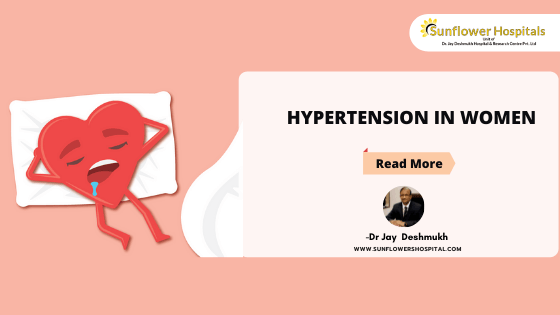Hypertension is always considered a men’s health problem. This however is a myth. In living up to 5 th decade men and women have almost equal level of risk of having high blood pressure. But after the onset of menopause, women however actually face a higher risk of getting hypertension. Prior to age 45, men have an increased tendency to have hypertension.
What are the commonest symptoms of high blood pressure?
In fact, the commonest symptoms are no symptoms. Many women with high blood pressure may be having their routine like being a homeworker or going to an office or hospital or doing some business activity from home or going out on work. In spite of their being active at all times, little do they know that they are suffering from hypertension. Hence blood pressure measurement once in 3 months is a must if you have crossed 40 years. Make sure that it does not exceed 140/90. Headache, dizziness, palpitations, shortness of breath, cramps in legs or blurring of vision, and sometimes bleed. ing from the nostrils is seen in a few.
why her tension Symp- in women?
The symptoms are no different than in men. Women may at times present with paralysis either due to thrombosis in a blood vessel in the brain or may have a serious brain hemorrhage. Some women may present with breathlessness or a heart attack. These could be one of the first symptoms due to high blood pressure. Some may have swelled over the face or feet and this could be the manifestation of kidney failure.
What about high blood pressure in young women or girls?
Obesity is a part of metabolic syndrome. Some of these girls or young women may have hypertension. Fatty liver and polycystic ovarian dis-ease or PCOD may be an accompaniment. High blood pressure is not uncommon during the first pregnancy. This is common in obese young women with a background of PCOD or diabetes in pregnancy Preeclampsia is seen after 20 weeks in pregnancy. Preeclampsia is a pregnancy complication characterized by hypertension, protein in the urine, and damage to kidneys or liver. If left untreated it can be fatal to both the mother and the baby. Some young women may develop hypertension due to oral contraceptives.
What are the specific non-drug therapies for hypertension in women?
Salt restriction certainly helps in post-menopausal women. Weight loss strategies are beneficial in women particularly in older women who have gained weight in their middle age. DASH diet has shown incremental benefits in lowering blood pressure in women. Avoiding alcohol and smoking helps in reducing blood pressure. Combined aerobic exercises and resistance exercises help to lower blood pressure in women. The role of cardiovascular dynamics and long-term cardiovascular benefits is well establish shed.
What are the specific drug therapy recommendations for women with hypertension?
Presently there are no substantial evolution differential effects of anti-hypertensive therapy based on gender. Diuretic therapy reduces calcium excretion and may prevent osteoporosis. Women tend to have more side effects due to antihypertensive treatment than men. This may impact the choice of treatment and adherence to therapy. Calcium channel blockers used for hypertension are more beneficial in women for stroke prevention.
Which antihypertensive drugs are not given in pregnancy or in women with reproductive potential?
ACE inhibitors, angiotensin receptor blockers, direct renin inhibitors, and mineralocorticoid inhibitors are strictly contraindicated in women of reproductive potential because of the risk of fetal abnormalities.
What is the sequela of hypertension in pregnancy, even if the delivery is normal?
Recent emerging data indicates that these women have a higher incidence of Alzheimer’s disease, Diabetes Mellitus, Ischemic heart disease, and stroke.
Hypertension is the most common modifiable risk factor for cardiovascular dis-ease, the leading cause of death worldwide. Young women are protected against hypertension in part due to endogenous estrogen. Women have a unique form of hypertension related to the use of oral contraceptives, pregnancy, and menopause. The most challenging part is a diagnosis of hypertension by measuring blood pressure at frequent intervals, having a healthy lifestyle, and continuing treatment unless suggested.

